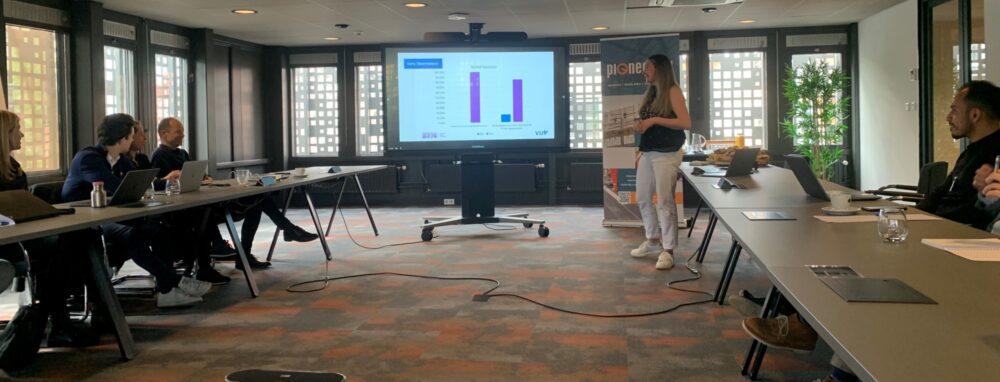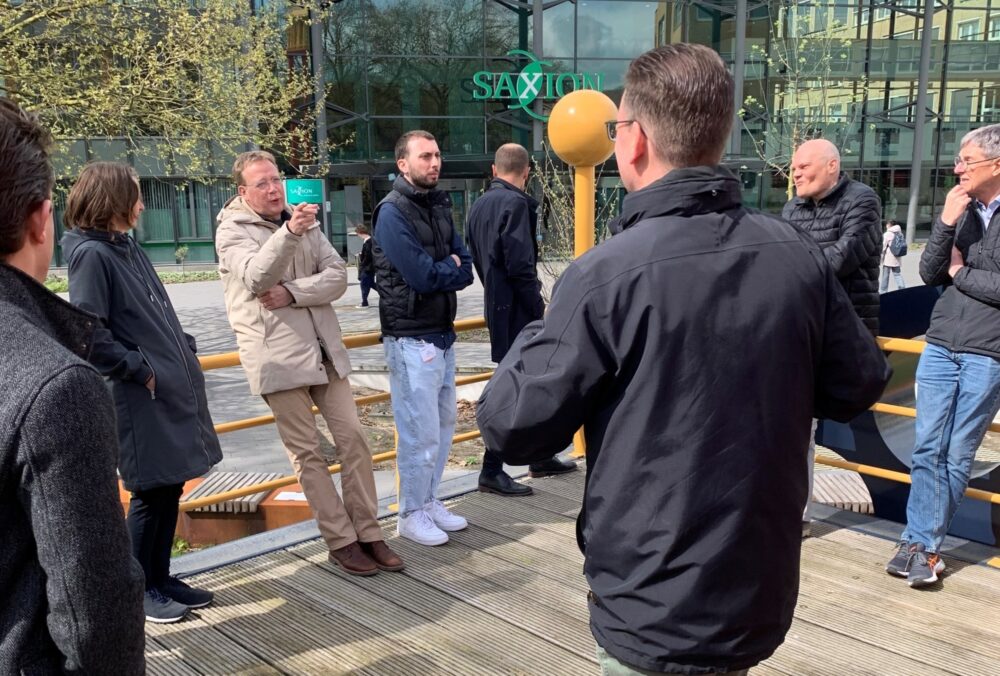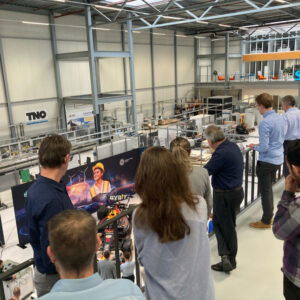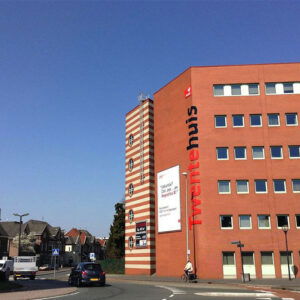On Tuesday, April 9, 2024, those involved in the Fieldlabs@Scale project met at TwenteBoard. During a full-day program, visitors caught up on the latest developments within the project, went on a field lab safari through Enschede and were inspired by stories about field labs in Twente.
Knowledge exchange by consortium partners
The consortium partners met in the morning. The aim was to learn from each other about the different variables of Field Labs and how they can be investigated in relation to the success of scaling up a Field Lab. After a short opening by Hans Berends (Professor at the Vrije Universiteit Amsterdam), Stefan Nijwening from the Vechtstromen Water Board took the floor. As Innovation Manager of the Vechtstromen Water Board, Stefan is continuously looking for innovative developments to realize new Field Labs. The aim of the Field Labs is to put the innovations into practice after an extensive testing phase.
Field Labs Safari
After this presentation, the PhD students took over. Hannah Fults, Orlando Vazquez Villegas and Lucas Vadacca gave updates on their projects.
- View here the presentation from Orlando Vazquez
- View here the presentation from Hannah Fults
- View here the presentation from Luca Vadacca
Then the group went on a field lab safari to two field labs at Saxion University of Applied Sciences:
First the group visited the Saxion climate square. Kristoff Derveaux took the consortium partners around the square and explained how the field lab came about and how students are involved. The unique thing about the Saxion Climate Square is that it now has an important role as a social meeting point where students from Saxion University of Applied Sciences can take a break, as well as a large testing ground for experiments led by students.
Another Field Lab within walking distance of the Saxion Climate Square is the Smart Tiny Lab. The Smart TinyLab is a field lab where construction partners and construction-related companies can develop, test, validate and demonstrate their innovative products in practice. Rob Meester told the group about the current test setups and how they are tested.
In both field labs, we looked at which variables ensure that the field lab is successful. For example, financing must be secured, the right partners must be involved and there must be trust. But which other variables influence the success of a Fieldlab will be investigated in Fieldlabs@Scale.
Fieldlabs@Scale as a blueprint for future fieldlabs
The first part of the day ended with a presentation by Hans Hilbrands, director of Pioneering. Fiedlabs@Scale is an interesting project for Pioneering. What if this project can provide a blueprint for future field labs and increase the success and scale-up factor.

Introduction Fieldlabs@Scale
The second part of the program started at 3 p.m., which was open to the public for external parties. Leentje Volker from University of Twente opened the afternoon program. She first gave a brief explanation of the Fieldlabs@Scale project. Within a field lab, knowledge institutions, companies and other regional organizations experiment with new solutions to social problems. However, the innovations developed in this way often prove difficult to scale up in practice.
In the Fieldlab@Scale project, the interdisciplinary consortium conducts research into scaling up mission-driven innovations through field labs in various domains: smart industry, healthcare, agriculture and infrastructure. Together with policy makers, regional network organizations, field labs and their underlying organizations, the project team maps out the mechanisms for joint experimentation and, based on these insights, develops useful tools and a training program for conducting field labs.
ASPARi; making asphalt construction more sustainable
The first keynote presentation of the afternoon program was given by Seirgei Miller about ASPARi. ASPARi is a field lab conducted by researchers from Twente in collaboration with a number of major contractors and public clients in the Netherlands. The focus is on making asphalt construction in the Netherlands more sustainable. Within the field lab they are working on
- Gaining insight into the construction (operational) methods of asphalt roads.
- Integrating the construction process with other phases of the process (such as design or work preparation).
- Applying SMART technologies.
- Integrating research, process improvement, training, and technology development.
ASPARi is all about collaboration and shared responsibility. Companies contribute financially and have equal say, allowing them to influence the direction of research programs. Workshops, meetings and symposia ensure continuous exchange of knowledge and experience.
ZoARG; reductie graafschades
Leon Olde Scholtenhuis presented about the ZoARG field lab. ZoARG stands for Careful Construction and Reduction of Excavation Damage. In 2016, the excavation sectors were shocked by a series of serious incidents, in which, for example, gas pipes were hit by excavators that were not on the map. This brought with it an urgency to improve the safety of excavation work and minimize excavation damage. It was in this context that the University of Twente and Reggefiber joined forces to work on this.
By 2024, this partnership, supported by various parties, has built an impressive ecosystem that focuses on development and research. The network includes a wide range of stakeholders, ranging from grid operators and contractors to green space managers, government agencies, regulators and developers.
Various instruments and technologies have been developed within ZoARG to improve the safety and efficiency of excavation work. This includes test trench toolkits, the development of a data model for the underground infrastructure, advanced 3D visualization techniques, the use of ground-penetrating radar to map cables and pipes, photogrammetry and machine learning. By combining these advanced methods, risks can be predicted and measures can be taken to prevent excavation damage.



